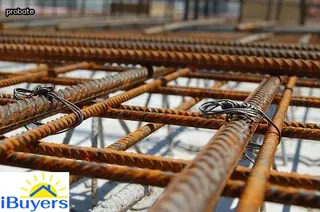When considering a California probate sale, it is important to understand the legalities involved. The process of a probate sale consists of several steps that require hard work and often involve expensive court costs.
In California, the probate process begins with filing the necessary paperwork with the county superior court. This paperwork must detail the executor or administrator's authority to act on behalf of the estate, as well as any fees associated with the sale.
After filing, notice must be given to all interested parties of the impending probate sale. As part of this process, a copy of the death certificate will need to be provided, along with other documentation such as an appraisal report and title report.
Depending on the county, it can take up to two months for a judge to approve or deny a petition for probate sale. Once approved by the court, interested buyers can begin submitting offers for consideration in accordance with California law.
If there are multiple offers submitted for consideration during probate, then those offers may need to be accepted through an auction process. After completion of these steps and acceptance of an offer by an executor or administrator, all parties involved will need to sign closing documents in order for escrow and title companies to finalize the sale according to California real estate laws.

The process of buying a home in probate can be complex and intimidating, however understanding the steps involved can help make it easier. The first step is to locate an estate that is being sold through probate.
This generally requires researching public records or working with a real estate agent who specializes in probate sales. After locating an estate, buyers will need to determine if the property is being sold as-is or if any repairs are needed prior to closing.
If repairs are needed, buyers should contact a qualified inspector and estimate the cost of those repairs. The next step is to obtain an appraisal of the home and submit an offer on the property.
Once the offer is accepted, buyers should retain legal counsel to ensure that all documents associated with the sale are in order and properly filed. Finally, once all documents have been signed and approved, buyers can close on the home and take possession of their new property.
In the state of California, probate sales are subject to court supervision. Before any sale can be completed, the court must approve that it is in the best interest of all parties involved.
The court also has a say in who is appointed as an executor of the estate and how much commission they will receive. Any interested buyers must make an offer to the executor of the estate, who then submits it to the court for approval.
If approved, the sale can move forward with a court-appointed referee overseeing proceedings. This ensures that all relevant laws are properly followed and that fair market value is obtained for all assets being transferred.
Furthermore, any objections from creditors or other interested parties must be addressed and settled before closing on a property can take place.

The price of a property in probate is determined by the court-appointed executor, who will typically prepare a report outlining the fair market value. This report takes into account the current condition of the property and any improvements that have been made, as well as comparable sales in the area.
In California, it is also important to consider any liens or encumbrances that may be attached to the property when determining its value. The executor will usually obtain an appraisal from a qualified appraiser to determine the fair market value.
Once this is established, interested buyers can submit offers on the probate property for consideration by the court-appointed executor. In some cases, an auction may be held where buyers can bid on the property and compete for ownership.
Ultimately, it's up to the discretion of the court-appointed executor to accept or reject offers on a probate sale in California real estate.
When examining the buyer offer process in a probate sale in California real estate, it is important to understand the steps and regulations involved. First, the seller must submit a Notice of Proposed Action to all interested parties, which will include a copy of the proposed terms of sale.
The notice must be filed with the County Recorder's Office in order to become effective. Next, any interested buyers can submit an offer to purchase the property within the specified timeframe outlined in the notice.
Once all offers have been received, it is up to the seller to decide which offer they would like to accept. All accepted offers must be submitted in writing and signed by both parties before becoming legally binding.
Additionally, in some cases additional paperwork may need to be completed such as an Acceptance of Offer or Proof of Funds form. Finally, if all documents are properly prepared and executed, then closing can take place soon after.
It is essential that buyers understand these steps prior to submitting an offer so that they are prepared for every step of this process from start to finish.

The Judicial Confirmation of a Probate Sale is an important step in the probate sale process in California real estate. It is the final court-approved step to ensure that the terms and conditions of the sale are fair and just for all involved parties.
This process typically takes place after the executor of an estate has negotiated the terms of a sale with potential buyers and submitted a petition to court for confirmation. The court will review any objections from interested parties, such as creditors or family members, before confirming the sale.
Every effort must be made to ensure that all creditors have been paid and that assets are allocated properly to beneficiaries before proceeding. After judicial confirmation is granted, the sale can be officially completed, ensuring a smooth transaction for all involved.
When a property is in probate, the sale must be completed within a certain amount of time. In California, the court will typically set a deadline for the sale to be finished by.
This timeline depends on a variety of factors such as whether or not there are any disputes between heirs or creditors and how quickly the executor of the estate can move forward with the transaction. The court will also identify essential steps that must be completed before the sale can occur such as having an appraisal performed or obtaining certified copies of documents from the county recorder's office.
It is important to understand these deadlines and keep track of them in order to ensure that everything is done correctly and within the given timeframe. Working with an experienced real estate agent can help make sure that all of these tasks are completed on time and that no steps are skipped during this process.

Navigating the first steps of an estate after death can be a difficult and overwhelming process. In California real estate, it is important to understand the probate sale process in order to ensure that all legal requirements are met and that the rights of all heirs are respected.
Knowing what to expect when dealing with probate sales will help ensure a smooth transition and allow for a successful transaction. There are several steps involved in the probate sale process, including obtaining court authorization, properly identifying and notifying heirs, filing necessary paperwork, and hiring an experienced real estate agent who is familiar with the process.
Additionally, understanding how taxes may be affected by the sale and ensuring that any liens or mortgages on the property have been paid off prior to closing are also important factors when navigating a probate sale in California. With careful planning and knowledge of the necessary steps, a successful probate sale in California real estate can be achieved.
Selling a home during probate in California can be a complex process, so it is important to understand what to expect before beginning. The probate sale process typically begins with the appointment of an executor of the estate by the court.
This person is responsible for managing the sale and ensuring that all parties involved comply with state laws. Once the executor has been approved, they will work to ensure that all required paperwork is completed properly and on time.
In addition, they will also be responsible for obtaining any necessary permits or documents associated with the sale. Next, they will list the home for sale and begin marketing it in accordance with state laws.
Finally, they will handle negotiations between interested buyers and review offers before submitting them to the court for approval. It is essential to note that all transactions must be conducted in accordance with California real estate laws and regulations as well as probate court orders throughout this process.

Utilizing UpNest's services for selling during probate can be an invaluable tool when navigating the complex probate sale process in California real estate. The specialized team of realtors at UpNest have experience working with executors and administrators to ensure that all legal requirements are met.
They are knowledgeable about the court process, and can provide guidance on how to best prepare the property for sale while adhering to the court's timeline. Furthermore, they understand the nuances of probate sales, and can help sellers maximize their return without sacrificing convenience or control.
Thanks to their comprehensive approach to marketing properties for sale, UpNest is well-positioned to help sellers find qualified buyers quickly and efficiently; this means less stress and fewer delays during a difficult time. With UpNest at their side, sellers will have peace of mind knowing that their property is being handled with care throughout the entire transaction.
The SCHEDULE a document is an important part of the probate sale process in California real estate. It provides information about the estate, including all assets, liabilities and distributions to beneficiaries.
The SCHEDULE a must be completed and signed by the executor or personal representative of the estate before any sales transaction can take place. This document serves as proof that the executor has taken into account all assets, debts and distributions when determining how much money will be owed after the sale has been completed.
In addition, it must be filed with the court prior to any transfer of property from an estate to another party. Once filed with the court, it becomes a public record and is available for anyone to view.
Understanding how this document works and its importance in dealing with an estate is crucial to ensuring a successful real estate transaction in California.

When dealing with an estate in California real estate, there are a few important pages to consider. It is important to understand the probate sale process and the court's role in it.
The first page to review is the Petition for Probate which outlines the details of the estate and names who will be in charge of administering it. The Letters of Administration or Testimony provide legal authority to those appointed by the court as executors or administrators of the estate.
It is also necessary to review any accountings that have been filed with the court, as these will outline any existing debts or taxes that must be paid from the estate before selling it. The Order for Probate Sale allows an executor or administrator to sell real estate assets, including property, if needed.
Lastly, any deeds that are recorded with the county recorder must include a copy of the Grant Deed which provides legal title transfer between parties involved in the sale.
Consulting professionals for assistance with an estate is a necessary part of the probate sale process in California real estate. Expert guidance from lawyers, accountants, and other knowledgeable professionals can help to ensure that all legal requirements are met throughout the transaction.
Consulting professionals also provides assurance that an individual's wishes are honored as outlined in their will. They can assist with preparing and submitting documents, including petitions for probate and related filings, to the court system while providing advice on matters such as estate tax laws.
Professionals may also be consulted to identify any potential liabilities associated with the estate or to provide guidance on how best to distribute assets in accordance with the deceased's wishes. It is important to remember that consulting a professional does not guarantee a successful outcome but it can offer peace of mind when dealing with complicated matters related to an estate.

When it comes to estate sales, there are some common mistakes that should be avoided in order to ensure a smooth and successful sale. One of the key elements when it comes to understanding the probate sale process in California real estate is making sure that all parties involved have a clear understanding of the details and timeline of the transaction.
It's important to be aware of the applicable laws, such as the California Probate Code, and any other related regulations that may apply. Additionally, ensuring that all necessary paperwork is completed accurately and submitted on time can help avoid costly delays or potential legal issues down the road.
Furthermore, having a thorough understanding of market values for local properties will help in making sure that you get the best possible deal for your estate sale property. Taking these precautions can go a long way towards avoiding common mistakes during an estate sale.
When exploring the different types of listings in California real estate, it is important to understand the probate sale process. Probate sales are an important part of the real estate market and can provide a great opportunity for buyers looking to purchase a property.
A probate sale is the sale of a property that was previously owned by someone who has passed away. The sale is handled through the court system and involves certain legal requirements, including filing paperwork with the court, obtaining approval from all interested parties, and ensuring that all debts related to the deceased's estate have been paid before any funds are released to heirs.
The most common type of listing for a probate sale is an “as-is” listing, which means that no repairs or improvements will be made prior to closing. This type of listing typically requires a higher deposit amount from buyers and may include additional costs associated with title insurance, appraisals, inspections, etc.
It is also important to note that a probate sale may take much longer than other types of real estate transactions due to the complexity of the legal process involved.
A probate listing in California is a type of real estate transaction where the sale of property occurs after someone has died. The process is regulated by the Probate Code and overseen by a court-appointed probate referee or executor.
The executor or referee must be approved by the court and is responsible for any claims made against the deceased's estate. During the probate sale, all debts and liabilities associated with the estate are addressed, including taxes owed and any creditor claims.
The goal of a probate sale is to sell the property at fair market value, so that heirs can receive their fair share of inheritance. A probate listing in California will also require an appraisal of the property to confirm its current market value.
Additionally, it may be necessary to obtain some additional documentation such as trust documents, wills or death certificates before proceeding with a purchase. With an understanding of these procedures and requirements, potential buyers can navigate through the process more easily and feel confident in their decision to purchase a home through a probate sale in California.

If you're looking to get a probate listing in California, there are certain steps you need to take to ensure that you understand the process properly. The first step is to familiarize yourself with the California Probate Code, which outlines the specifics of how a probate sale is conducted.
Next, it's important to contact an experienced real estate attorney or title company for information on the best way to obtain probate listings in your area. These professionals can provide valuable advice on how to navigate the legalities and paperwork associated with these types of transactions.
Additionally, it's wise to do some research on your own by visiting local county courthouses or visiting local real estate agents for information about available properties that have been placed into probate. Finally, once you've gathered all of your information, be sure to use the data collected during your research and speak with other experienced real estate investors who are knowledgeable about navigating through a probate sale in California.
Understanding the process thoroughly will help ensure that you make wise decisions when purchasing a property through this process.
Understanding the probate sale process in California real estate can be tricky. The probate sale process begins when an executor of a deceased person’s estate is appointed by the court and given the responsibility to pay off any debts or taxes owed by the deceased.
The executor then puts the property up for sale and begins marketing it, often through a real estate agent or broker. Potential buyers must submit their offer to purchase the property, which is then approved or rejected by the court.
If accepted, the buyer must then provide a deposit to secure their offer and begin making progress payments toward purchase of the property. The entire process must be completed within certain legal time frames, so all paperwork should be processed as quickly as possible.
The court will usually grant title transfer once all obligations have been met and payment for the property has been received in full. It's important to note that probate sales are subject to specific regulations and laws, so it's best to work with a qualified real estate attorney who can help guide you through this complex process.
The probate sale process in California real estate is a complex process that involves many steps and guidelines to ensure the estate is properly handled. One of the key questions that comes up often when discussing a probate sale is, "What is the maximum length of time for a probate listing in California?" The answer to this question depends on several factors, including the type of property being sold, the size of the estate, and any other legal considerations.
Generally speaking, a probate listing in California can last anywhere from six months to one year. However, if there are complications in settling the estate or if there are disputes regarding ownership or heirs, then it could take longer.
It's important to understand that while most probates can be completed within one year, some may take longer due to unforeseen circumstances. Additionally, it's important to note that many California counties have laws on how long a probate listing can remain open before it must be closed out.
Knowing this information ahead of time can help you plan accordingly and ensure your interests are protected during the process.